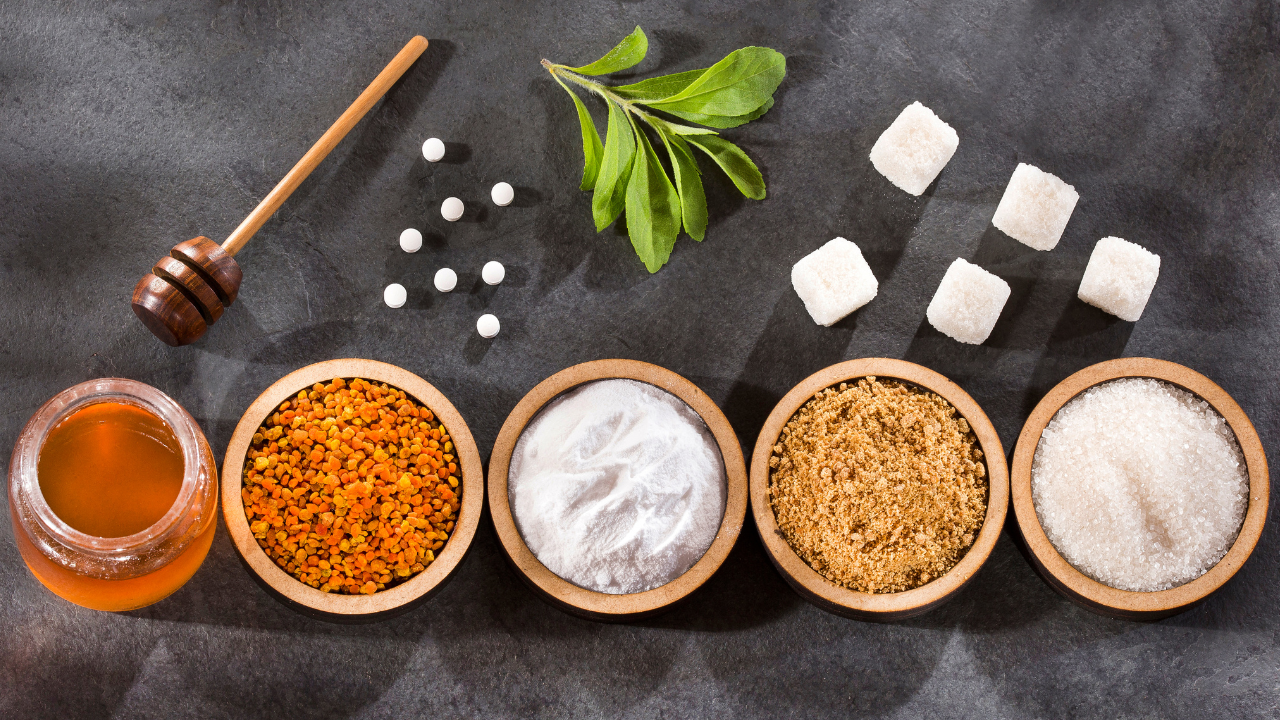The 8 Sweeteners You Should Know About for a Happier, Healthier Gut
If you’re working on healing your gut or managing bloating, the type of sweetener you use matters more than you think. While some options can support digestion or at least do no harm, others can irritate your gut lining, disrupt your microbiome, and trigger gas or bloating. Most people know that regular table sugar isn’t great for gut health — but it’s far from the only sweetener worth paying attention to. Below, we break down 8 of the most common sweeteners — the good and the bad — and how they affect your gut health.
🍯 1. Honey (USE IT)
Raw, unprocessed honey contains natural enzymes and prebiotics that can support beneficial gut bacteria. It also has antimicrobial properties, which may help control unwanted overgrowths. While it’s still a sugar and should be used in moderation, honey is one of the least processed and most gut-friendly sweeteners available.
🍁 2. Maple Syrup (USE IT)
Pure maple syrup is another natural sweetener with minimal processing. It contains small amounts of minerals like zinc and manganese and doesn’t tend to ferment in the gut the way some sugar alcohols do. It’s a great option for people looking for a gentle, low-reactive sweetener that doesn’t disrupt digestion.
🌿 3. Stevia (USE IT — IF PURE)
Stevia is a plant-based sweetener that’s popular for being calorie-free and blood sugar–friendly. However, not all stevia is created equal. The pure green-leaf extract or minimally processed versions are generally safe for the gut. But watch out for blends that include maltodextrin, erythritol, or artificial fillers — those can undo the gut-friendly benefits.
🍈 4. Monk Fruit (USE IT — IF PURE)
Like stevia, monk fruit is a zero-calorie natural sweetener, and the pure extract doesn’t feed bad gut bacteria or cause fermentation. But again, purity matters. Many monk fruit products are diluted with erythritol or other sugar alcohols that can cause bloating, especially in sensitive individuals. Look for monk fruit that doesn’t include anything else.
🚫 5. Sucralose (AVOID)
Sucralose (often sold as Splenda) is a synthetic sweetener linked to gut microbiome disruption. Studies show it can reduce beneficial bacteria and may increase gut permeability (aka leaky gut). It also doesn’t break down well in the body, making it a poor choice for anyone with digestive challenges.
🚫 6. Erythritol (AVOID)
While technically a sugar alcohol, erythritol is often marketed as a gut-safe sweetener because it's absorbed in the small intestine and excreted in urine. But for many people with sensitive guts, it can still cause bloating, nausea, or diarrhea — especially in large amounts. Recent studies also suggest it may have pro-inflammatory effects and could interfere with cardiovascular health.
🚫 7. Aspartame (AVOID)
Aspartame is a chemical sweetener commonly found in diet sodas and low-calorie foods. It’s been linked to microbiome imbalances and may worsen symptoms like gas, brain fog, and bloating in those with IBS or SIBO. While it’s approved by the FDA, it’s best avoided if you’re working on gut repair.
🚫 8. Acesulfame Potassium (AVOID)
Sometimes listed as Ace-K, this artificial sweetener is often added to protein powders, diet drinks, and sugar-free gums. It’s been shown to alter gut bacteria and increase glucose intolerance in animal studies. Although human research is still catching up, the early data is enough to raise red flags for gut-conscious individuals.
Final Thoughts
Your gut microbiome is a delicate ecosystem, and what you sweeten your food with can have a direct impact on your digestion and how you feel day to day. If you’re healing from SIBO, IBS, or frequent bloating, sticking with whole-food, minimally processed sweeteners like raw honey, pure maple syrup, and clean stevia or monk fruit can make a huge difference.
